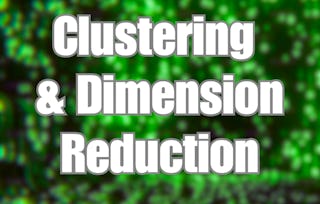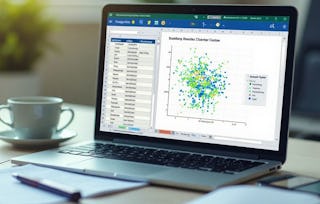This foundational course equips learners with the conceptual knowledge and practical skills needed to perform cluster analysis—an essential unsupervised machine learning technique—using SPSS. Through a blend of theoretical exploration and hands-on implementation, learners will define, differentiate, apply, and evaluate key clustering methodologies, including hierarchical methods, k-means clustering, and Two-Step cluster analysis.
即将结束: 只需 199 美元(原价 399 美元)即可通过 Coursera Plus 学习新技能。立即节省
您将学到什么
Explain clustering concepts and differentiate hierarchical, k-means, and Two-Step methods.
Apply preprocessing and clustering techniques in SPSS to segment real-world data.
Evaluate cluster quality using BIC/AIC criteria, dendrograms, and silhouette scores.
您将获得的技能
要了解的详细信息

添加到您的领英档案
August 2025
7 项作业
了解顶级公司的员工如何掌握热门技能

该课程共有2个模块
This module introduces the fundamental principles of cluster analysis, a core technique in unsupervised machine learning. Learners will explore the conceptual basis of clustering, understand how clustering groups data points based on similarity, and investigate widely used clustering techniques including hierarchical clustering and k-means. Emphasis is placed on understanding how these methods operate, their practical applications, and the tools used to visualize and evaluate clustering results. By the end of this module, learners will gain a strong conceptual and technical foundation in clustering approaches, preparing them for more advanced machine learning techniques and real-world data segmentation tasks.
涵盖的内容
8个视频4个作业
This module focuses on the implementation and interpretation of cluster analysis techniques using SPSS. Learners will explore practical workflows involving Two-Step clustering and K-means clustering, including the evaluation of clustering quality and methods for handling missing data. Through hands-on demonstrations, students will gain experience with SPSS output interfaces, learn to navigate clustering diagnostics, and apply data preprocessing strategies such as listwise and pairwise deletion. The module equips learners with practical tools to translate unsupervised machine learning concepts into real-world analytical outputs.
涵盖的内容
4个视频3个作业
从 Machine Learning 浏览更多内容
 状态:免费试用
状态:免费试用University of Colorado Boulder
 状态:免费试用
状态:免费试用University of California, Irvine
 状态:免费试用
状态:免费试用University of Illinois Urbana-Champaign
人们为什么选择 Coursera 来帮助自己实现职业发展




学生评论
20 条评论
- 5 stars
85%
- 4 stars
10%
- 3 stars
5%
- 2 stars
0%
- 1 star
0%
显示 3/20 个
已于 Dec 19, 2025审阅
It’s suitable for students or professionals working with data analysis and research.
已于 Oct 17, 2025审阅
Great for students and professionals looking to strengthen their statistical and data interpretation skills with SPSS.
已于 Nov 28, 2025审阅
The instructor explains why cluster analysis is used in real situations, not just how to click through menus.
常见问题
To access the course materials, assignments and to earn a Certificate, you will need to purchase the Certificate experience when you enroll in a course. You can try a Free Trial instead, or apply for Financial Aid. The course may offer 'Full Course, No Certificate' instead. This option lets you see all course materials, submit required assessments, and get a final grade. This also means that you will not be able to purchase a Certificate experience.
When you purchase a Certificate you get access to all course materials, including graded assignments. Upon completing the course, your electronic Certificate will be added to your Accomplishments page - from there, you can print your Certificate or add it to your LinkedIn profile.
Yes. In select learning programs, you can apply for financial aid or a scholarship if you can’t afford the enrollment fee. If fin aid or scholarship is available for your learning program selection, you’ll find a link to apply on the description page.
更多问题
提供助学金,









